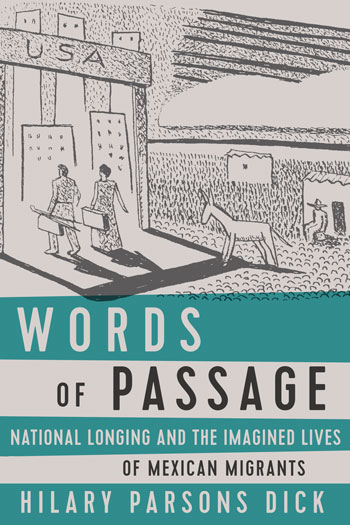Hilary Parsons Dick’s multi-site ethnography Words of Passage: National Longing and the Imagined Lives of Mexican Migrants is based on fieldwork conducted between 1997 and 2005 in Pennsylvania, U.S. and Uriangato, Mexico. The informative work considers the political landscapes, and how Mexican migrants have constructed their lives in the context of “becoming.” As we know, groups from Mexico make up the largest percentage of undocumented migrants in the United States, yet current U.S. policies attempt to make living in the U.S. untenable for migrants, so that they will return to Mexico and/or never consider migrating in the first place.
Dick’s writing illuminates “the many ways the imagined lives of migrants shape national belonging and resource access,” which is important to the discourse about immigration and its meaning in the 21st Century (226).
Words of Passage focuses on the multiple ways that being mobile facilitates how individuals define themselves as ‘Mexican’.
Composed of seven chapters, the book provides an illuminating discussion about migrants moving “in and out of legal statuses” that unpacks the terms “documented” and/or “undocumented”. It is this type of complexity around terms and categories that Dick considers throughout her work: one category cannot adequately describe the lives of the migrants, and indeed one category cannot describe any individual and/or group of people.
 Dick begins with an introduction using vignettes to situate her participants’ discussions in the religious, socio-economic, and political contexts of Mexico. These vignettes illustrate what it means to be Mexican, as well as how her research participants use their experiences to construct “the imagined lives of Mexican migrants” (p.5). Thus, people’s lives are composed based on what is happening, what could happen, and what might have happened, demonstrating how the actual and imaginary are co-linked.
Dick begins with an introduction using vignettes to situate her participants’ discussions in the religious, socio-economic, and political contexts of Mexico. These vignettes illustrate what it means to be Mexican, as well as how her research participants use their experiences to construct “the imagined lives of Mexican migrants” (p.5). Thus, people’s lives are composed based on what is happening, what could happen, and what might have happened, demonstrating how the actual and imaginary are co-linked.
In Chapter 1, Dick considers how state institutions are used to create an official definition of what it means to be Mexican (p.41). Mexico is in the process of becoming “distinct as a nation-state by virtue of not being like the United States” (p.41) and determining what “progress” means for the country as a whole. While this process is occurring,
Mexico is maintained in a liminal state of being wherein people are continually striving for “a distant future” that is not linked to who they are at the current time (p.41).
Therefore, according to the Dick’s interviewees the values of traditional-ness and modernity are in a state of conflict. In the current day, these values are continually creating “a social milieu in which some ways of being Mexican are normalized and others are not” (75).
Dick zooms into the impact of the migration process and how the process of migration enables or negates people’s personhoods, for example a male migrants manhood can depend on his ability to send remittances to family in Mexico (115). These activities give rise to the conflict between “morality” and “mobility” (121), and highlight how the U.S. is understood to be a place of urbanization and modernity. For example, owning a home is a key element in being someone in the Mexican context and migrating is one method to earn funds for homebuilding (130). In addition, as individuals contemplate migrating new ideals about family and marriage are constructed. Women are not necessarily interested in traditional, patriarchal relationships, but rather those that support “companionate marriage and nuclear family life” (148). Thus, Dick finds that whole families are migrating rather than just the males of the family; however, the ethico-morality of women who migrate alone, with families, and/or with their children is questioned, and the mobility of women is seen in a negative light (p.162). Therefore, Dick makes the point that migration as mobility illustrates how an individual (e.g., male or female) links to their personhood and acceptable behavior in the context of being a migrant from Mexico.
Two final comments about this book. First, Dick’s ethical principles for “giving back” to the communities that she worked with is a crucial element for her about how people conducting ethnography should engage in research.
As researchers, it is not an us versus them, but rather an “Us” that is important for telling contextually relevant stories about people’s lives and how the social, political, and geographic landscapes impact these stories.
Second, Dick points out that being an ethico-moral individual is crucial for many types of fieldwork and structures how researchers interact with their participants. This concept highlights the need to understand the cultural and social parameters in which fieldwork is conducted. Without being aware of this concept and these parameters, ethnographers will gain only a superficial understanding of the people they wish to know more about.
Dick’s ethnography provides an historical, geographic, and cultural landscape presentation about what it means to be a Mexican migrant and how that position is continually negotiated. This book presents an holistic view that other ethnographies may not grant, and offers not only a clear picture of how to conduct a thorough ethnography but also about how Mexican migrants contextualize their own lives in terms of the past, present, and imagined future.
Dick, H.P. 2018. Words of Passage: National Longing and the Imagined Lives of Mexican Migrants. Austin: University of Texas Press. 283pp. ISNB-13: 978-1-4773-1402-9.



